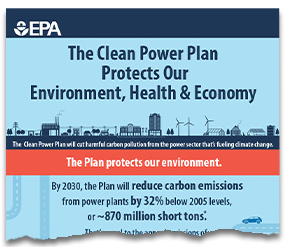U.S. Moves Ahead with Carbon Rule, States to Sue
The U.S. Environmental Protection Agency will formally issue carbon regulations for power plants on Friday, opening the door to a wave of lawsuits from states and industry groups.
The EPA will publish its Clean Power Plan in the Federal Register, a formal step that will start the clock on legal challenges from opponents of the rule.
The Obama administration unveiled the final version of the Clean Power Plan on Aug. 3. It aims to lower emissions from the country's power plants by 32 percent below 2005 levels by 2030.
President Barack Obama called the rule the biggest action the United States had taken to date to address climate change.
On Friday, West Virginia will announce its plans to take legal action against the EPA, leading a coalition of 25 states who think the rule is illegal and will cause them economic harm.
"West Virginia, working with a large bipartisan coalition of other States, will be filing suit and seeking a stay of the rule promptly tomorrow," said the state's attorney general Patrick Morrisey.
On Aug. 15, West Virginia and 14 other state attorneys general petitioned the U.S. Court of Appeals for the D.C. Circuit to stay the rule but the court later declined because it had not yet been published in the federal register.
To obtain a stay, petitioners must show likelihood that they will ultimately win the case and suffer "irreparable harm" if a stay is not granted.
Industry and state lawyers have said they believe the regulation will exceed the scope of the 45-year-old Clean Air Act, the law under which the EPA is acting.
Critics say in part that the law only allows the government to regulate greenhouse gases spewed directly from "an existing source" such as individual power plants.
One business group that is expected to file suit against the EPA, the U.S. Chamber of Commerce, which represents a range of American companies.
"We're all watching the Federal Register each morning, but I can't share anything about the Chamber's plans yet," said Matt Letourneau, a spokesman for the Chamber's Institute for 21st Century Energy.
(Reporting By Valerie Volcovici; additional reporting by Lawrence Hurley)







